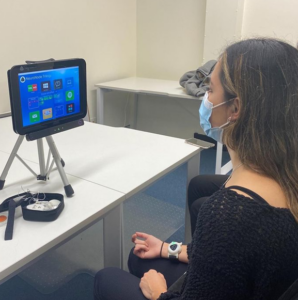- Assessment of tongue tie
- Screening for sleep and airway issues
- Mouth breathing and open mouth posture
- Breaking thumb-sucking and other oral habits
- Tongue thrust swallowing
- Lisps associated with a tongue thrust
- Chewing difficulties
- Impacted dentition and post-orthodontic intervention
- Pain in the temporomandibular joint (TMJ)
- Asymmetrical appearance of the face or lips
- Taking supplementary breaths through their mouth or sounding out of breath when reading aloud.
- Chapped, dry lips.
- Daytime sleepiness with dark circles under their eyes.
- Snoring/audible breathing and/or tooth grinding at night.
- Recurrent need for grommets and/or nasal sprays.
- Had adenoids and tonsils removed.
- History of speech articulation difficulties (i.e., lisps)
- Previous difficulties latching and the presence of oral ties.
- Dental crowding or no space between baby teeth.
- Malocclusions (i.e., open-bite, deep-bite, under-bite, over-jet)
- Oral habits (i.e., nail-biting, thumb-sucking or prolonged dummy use)
- Elongated facial features.
- A small jaw and/or associated pain.
- Elongated facial features, overactive facial muscles, jaw pain, etc.
- Attention/concentration/behavioural concerns and anxiety.
- Digestive issues (i.e., constipation, encopresis)
Exercise can be hugely beneficial in the management of chronic conditions and disabilities. You can improve strength, balance, sleep, the effectiveness of pharmacological interventions, and cognition. Exercise Physiologists’ can assist any individual who may benefit from exercise, including those with physical and mental health conditions.
Connect2Care’s Melbourne-based Exercise Physiologist, Matilda, has been working alongside her client to find a sustainable and enjoyable regime, resulting in improved compliance and better outcomes. The goal was to increase independence, strength, and confidence, and Matilda was able to engage her client in the activity of boxing successfully.
Matilda’s client continues to engage in weekly Exercise Physiology sessions and regularly performs their home exercise program outside of these sessions. The results have been astounding, with her client indicating that daily boxing is an incredibly positive method of managing her negative emotions. They have also demonstrated improvement in their strength and technique. Matilda is now working on incorporating more challenging variations of exercises into the exercise program so that her client can continue to reach and exceed exercise goals, striving to improve their physical and mental health.
NDIS Approved Exercise Physiology | Connect2Care
It is Connect2Care’s mission to provide excellent quality services and support to our clients in ways that make them feel empowered and allow them to achieve their goals.
Recently, our Physiotherapist Lisa had a breakthrough with a client. The client had previously been hospitalized for 10 months, during which he saw progress and regression with his ability to stand.
|
|
|
NDIS Physiotherapy | Physiotherapy Services | Connect2Care
Assistive technology can be highly beneficial for helping to maintain and improve everyday functions. The use of assistive technology can create more independence and increase opportunities to perform tasks and make decisions.
Some examples of the assistive technology provided at Connect2Care include:
- Communication and information equipment
- Assistive products for hearing and vision
- Personal Mobility equipment
- Assistive products for personal care and safety
Our Occupational Therapists and Speech Pathologists provide different types of assistive technology to their clients. One specific assistive technology provided by Connect2Care’s speech pathologists is a high-tech device that allows people to communicate when they don’t have the option to communicate verbally.
This device allows people to communicate using their eyesight and slight body movements. Using this device can give people the ability to convey their thoughts and how they feel when they otherwise may not have been able to.
NDIS Assistive Technology | Connect2Care
Exercise Physiology is a service provided at Connect2Care that involves exercise-based therapy and intervention for various health issues. Exercise Physiologists help to treat and manage chronic conditions, injuries and disabilities through exercise. This is a well-established treatment modality to reduce the risk of disease and improve outcomes for people experiencing chronic disease.
Exercise physiologists prescribe exercise interventions that are specific to each individual. They also provide patient education and can assist with facilitating behaviour change for long-term health benefits.
Exercise physiologists can work with a wide range of health conditions and can also help prevent and manage injuries.
They use multiple forms of exercise treatment, including strength training, aerobic training, balance and hydrotherapy.
“If the benefits of exercise could come from a pill, every doctor would prescribe it” – Matilda, Exercise Physiologist.
There are endless benefits that come from exercise, and our Exercise Physiologist can help you achieve these benefits.
NDIS Approved Exercise Physiology | Connect2Care
The Allied Health capability framework provided by health.vic is to understand the capabilities of allied health to support the needs of those with disability.
The domain of Individual support and its capabilities are as follows:
1. Understands disability and complex support needs
2. Promotes independence and informed choice
3. Works in partnership with the person to set and achieve goals
4. Thinks flexibly and tailors interventions to the person
5. Communicates effectively
6. Works collaboratively with the person’s supports
Interprofessional practice:
7. Operates within the scope of practice
8. Collaborates with interprofessional
Systems:
9. Navigates the National Disability Insurance Scheme
10. Collaborates across service systems
Quality, Safety and Ethics:
11. Acts ethically and resolves conflicts
12. Promotes safety, quality and inclusion
What is At-Home Care?
At-home, mobile care is a service where healthcare and support are provided in the comfort of one’s own home. This approach is particularly beneficial for individuals managing long-term conditions, disabilities, and mobility issues.
Benefits of At-Home Care
- Comfort of Familiar Surroundings: At-home care allows clients to receive professional support in the familiar setting of their own home, offering a sense of security and comfort that is invaluable for wellbeing.
- Maintaining Independence: Receiving care in one’s own home enhances personal choice and independence. It also includes the integration of assistive technologies that are tailored to suit the home environment, helping people to maintain a sense of autonomy.
- Focused and Individualised Care: Services are designed to focus on specific areas of need and take the environment into consideration, ensuring effective and personalised care.
- Personal One-on-One Sessions: At-home care is delivered as one-on-one care, fostering a deeper and more personal relationship between the client and therapist, which is fundamental to effective care.
- Supporting Families: At-home care also greatly benefits family members, particularly those who are primary carers. Sharing the caregiving responsibilities offers family members much-needed respite and peace of mind.
Connect2Care’s At-Home and Mobility Services
Dyslexia is a very common learning disability in Australia, with an estimated 20% of children suffering from mild to severe dyslexia. By working with a speech pathologist for speech therapy for dyslexia, individuals gain several benefits.
What is dyslexia?
Dyslexia, primarily known as a language-based disorder, significantly impacts an individual’s ability to read. For individuals with dyslexia, honing reading strategies and skills becomes a vital part of their journey.
The role of speech therapy in managing dyslexia
Speech pathologists help with the assessment and treatment of dyslexia. They are trained to access overall language skills, including those critical to reading, such a phonological awareness and subsequent targeting intervention to help individuals with dyslexia learn to read.
Phonological awareness is essential for reading, writing, rhyming, and manipulating syllables, such as blending and segmenting. These skills allow us to understand what sounds make up a particular word and manipulate sounds to form words. Programs that target phonological awareness and literacy skills are available, such as ‘The Gillon Phonological Awareness Training Programme.’
Benefits of speech therapy for dyslexia
- Building Phonological Skills: A key focus in dyslexia therapy is enhancing phonological awareness. This makes the process of reading and writing more approachable and less daunting.
- Reading with Ease and Understanding: Through speech therapy sessions, individuals with dyslexia can improve their reading skills. This leads to better understanding and enjoyment of reading, turning a challenging task into a delightful experience.
- Growing Confidence: As reading becomes less challenging, there is often a wonderful growth in self-esteem. This newfound confidence can positively influence all areas of life, including school and social situations.
Speech pathologists at Connect2Care
Connect2Care’s experienced Speech Pathologists are ready to provide expert, caring assistance to unlock the full potential of every individual. Contact us today to learn more about our dyslexia therapy services and how we can support your journey towards success and confidence.
References:
1. The Gillon Phonological Awareness Training Programme booklet: Microsoft Word – programme booklet 2008.doc (canterbury.ac.nz)
2. Reading Rockets | Launching Young Readers this website provides general information about reading and some research-based reading strategies/intervention; it is also a good source for finding the appropriate books based on age, genre, and reading level.





